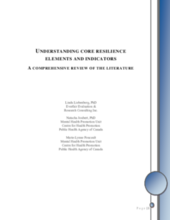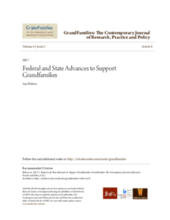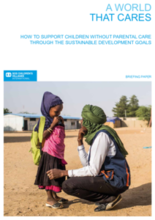Demographic Data
|
Sources: World Bank, UNDP, UNAIDS, DHS 2013 |
Displaying 10011 - 10020 of 14390
This article explores this practice, examines its origins, and discusses its constitutional inadequacies.
The article contains analysis of parental potential in foster families and the resources of its strengthening with the support of the professional community.
The aim of the paper is to explore selected pertinent challenges that impede child and youth care centres (CYCCs) from providing holistic support and care to children found in need of care as stated in the Children’s Act No. 38/2005.
This policy brief highlights the work of the Grandfamilies Advocacy Network Demonstration to advocate for policy reforms for grandfamilies in the US.
This rapid literature review was commissioned by the German Research Centre on Adoption (EFZA) located at the German Youth Institute in Munich (Germany). The overall aim of the review was to consider the support needs of domestic and intercountry adoptive families and the evidence for effective interventions. Step-parent, relative and domestic private adoptions were excluded.
This brief paper highlights some of Young Lives key findings on violence affecting children, exploring what children say about violence, how it affects them, and the key themes that emerges from a systematic analysis of the children’s accounts.
This guideline aims to provide evidence-based recommendations for quality clinical care for children and adolescents who have, or may have, been subjected to sexual abuse, in order to mitigate the negative health consequences and improve their well-being.
This brief summarises key findings of a qualitative study of the family strengthening approach of the Isibindi model.
This briefing describes how the needs of children without parental care can be addressed through five of the SDGs: no poverty (1); quality education (4); decent work and economic growth (8); reduced inequalities (10); and peace, justice and strong institutions (16).







